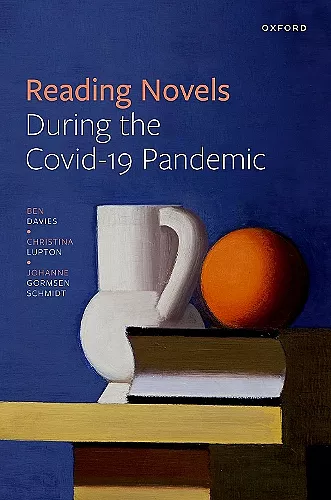Reading Novels During the Covid-19 Pandemic
Ben Davies author Christina Lupton author Johanne Gormsen Schmidt author
Format:Hardback
Publisher:Oxford University Press
Published:17th Nov '22
Should be back in stock very soon

Drawing on an ethnographic study of novel readers in Denmark and the UK during the Covid-19 pandemic, this book provides a snapshot of a phenomenal moment in modern history. The ethnographic approach shows what no historical account of books published during the pandemic will be able to capture, namely the movement of readers between new purchases and books long kept in their collections. The book follows readers who have tuned into novels about plague, apocalypse, and racial violence, but also readers whose taste for older novels, and for re-reading novels they knew earlier in their lives, has grown. Alternating between chapters that analyse single texts that were popular (Albert Camus's The Plague, Ali Smith's Summer, Charlotte Brönte's Jane Eyre) and others that describe clusters of, for example, dystopian fiction and nature writing, this work brings out the diverse quality of the Covid-19 bookshelf. Time is of central importance to this study, both in terms of the time of lockdown and the temporality of reading itself within this wider disrupted sense of time. By exploring these varied experiences, this book investigates the larger question of how the consumption of novels depends on and shapes people's experience of non-work time, providing a specific lens through which to examine the phenomenology of reading more generally. This timely work also negotiates debates in the study of reading that distinguish theoretically between critical reading and reading for pleasure, between professional and lay reading. All sides of the sociological and literary debate must be brought to bear in understanding what readers tell us about what novels have meant to them in this complex historical moment.
This brilliantly written and meticulously researched book makes a major new contribution to literary studies. It demonstrates the value and importance of sociological approaches to reading in expanding the methods of the discipline and enabling new evidence-based insights into how lay readers read. It combines this with a sensitivity to text and temporality, narrative and nuance, that surely cannot but be approved of by even the most stalwart defenders of traditional literary critical methods. * Sarah Dillon, Professor of Literature and the Public Humanities, Faculty of English, University of Cambridge *
How did the pandemic change our relationship to books? This eagerly awaited study does a deep dive into the role of literature in a time of crisis, looking closely at what and how people read in 2020 and 2021 as well as the times and places in which they picked up a book. The results are fascinating, revealing, and often unexpected * Rita Felski, University of Virginia *
Did anyone actually spend the pandemic reading Proust? Find out in this intimate and revealing account of all the ways books kept us company during a time of almost unbearable isolation * Matthew Rubery, Queen Mary University of London *
This is an extremely important book, mixing literary theory with qualitative and quantitive data in an innovative way in order to understand how and what we read during the pandemic, and what this means. It provides a vital insight into the life of literature during a crisis * Robert Eaglestone, Royal Holloway University of London *
Overall, the book is a very timely contribution to discussions surrounding the seismic cultural and societal shifts triggered-or merely made visible-by the pandemic. The authors are well aware that their sample can shed light only on a slice of the reading public, but through their in-depth interviews and careful curation of the responses, we are treated to fascinating insights about readers and reading during the pandemic. Readers of the monograph will certainly think back to their own pandemic reading practices (and perhaps glance at their pandemic reading diaries?) as they peruse the pages of this tome. * Corinna Norrick-Rühl, University of Münster, Germany *
Reading Novels During the Covid-19 Pandemic is an expansive, theoretically suggestive, and very engaging exploration of literature during an unprecedented global crisis. It presents multifaceted perspectives on the complexity of finding time for reading amid a global crisis. Above all, the volume contributes significantly to the fields of literary sociology and ethnography as well as criticism. * Claire Chambers, C21 Literature: Journal of 21st-Century Writings *
- Winner of Winner, 2022, BACLS monograph prize.
ISBN: 9780192857682
Dimensions: 241mm x 163mm x 19mm
Weight: 494g
224 pages